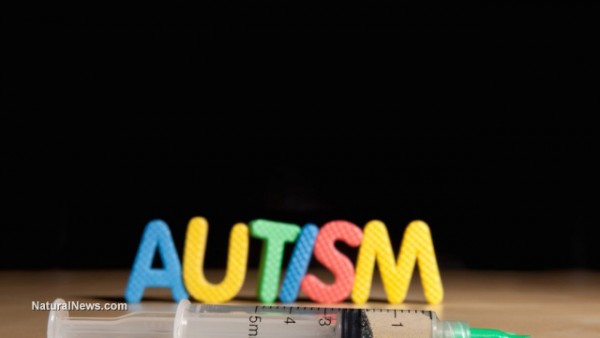Autism risk 420% higher in vaccinated children vs. non-vaccinated, published science confirms
06/01/2017 / By Vicki Batts

A recent study led by researchers from the School of Public Health at Jackson State University has come to some shocking conclusions about vaccinated children. Perhaps one of the most jaw-dropping finds was that vaccinated children exhibited a 420 percent higher incidence of autism when compared to non-vaccinated children — as well as a staggering increased incidence of neurodevelopmental disorders (NDD) in general.
As Robert F. Kennedy Jr notes, the researchers stated:
In a final adjusted model designed to test for this possibility, controlling for the interaction of preterm birth and vaccination, the following factors remained significantly associated with NDD: vaccination (OR 2.5, 95% CI: 1.1, 5.6), nonwhite race (OR 2.4, 95% CI: 1.1, 5.4), and male gender (OR 2.3, 95% CI: 1.2, 4.4). Preterm birth itself, however, was not significantly associated with NDD, whereas the combination (interaction) of preterm birth and vaccination was associated with 6.6-fold increased odds of NDD (95% CI: 2.8, 15.5) (Table 8).
Acclaimed epidemiologist Dr. Anthony Mawson, has authored more than 50 studies and led the astonishing research. In addition to the finding of an overall increased risk of NDD, he and his team also found that there was 420 percent increased risk of both autism and ADHD in vaccinated children. Vaccinated children were also 30 times more likely to have allergic rhinitis and 2.9 times more likely to have eczema than non-vaccinated children. Vaccinated kids also exhibited a staggering 520 percent greater likelihood of having a learning disability.
But it’s not just the matter what risks are increased that is so disturbing about this study. Many proponents of vaccine propaganda are prone to disregarding these kinds of risks as being part of the “greater good,” and maintain that any risk posed by vaccination is worth it to prevent disease. But what if vaccines don’t actually decrease the risk of disease — are these risks really worth it then?
Well, Mawson and his team also examined the risk of so-called “vaccine-preventable” illnesses among vaccinated and unvaccinated children, as well. And what they found was shocking: In most cases, there was no substantial difference between vaccinated and unvaccinated children. [RELATED: Learn more about vaccine deception at VaccineHolocaust.org]
In the case of chicken pox and pertussis, vaccinated kids did show a statistically significant decrease in the onset of illness compared to unvaccinated children. However, in the case of influenza, mumps, measles, rubella, rotavirus, meningitis, and hepatitis A or B, there was no significant difference in incidence among vaccinated and unvaccinated children.
In other words, vaccinated children are generally just as likely to get sick as unvaccinated children. Are the risks really worth it, if vaccines don’t actually offer increased protection?
Last year, Mike Adams revealed that an FDA document for the Tripedia vaccine actually listed autism as a possible effect of vaccination. You can view the full report here. The document states:
Adverse events reported during post-approval use of Tripedia vaccine include idiopathic thrombocytopenic purpura, SIDS, anaphylactic reaction, cellulitis, autism, convulsion/grand mal convulsion, encephalopathy, hypotonia, neuropathy, somnolence and apnea. Events were included in this list because of the seriousness or frequency of reporting. Because these events are reported voluntarily from a population of uncertain size, it is not always possible to reliably estimate their frequencies or to establish a causal relationship to components of Tripedia vaccine.
When even the manufacturer is providing the government with information that shows a vaccine carries the risk of autism, you know it’s got to be pretty risky.
Sources:
NaturalNews.com [PDF]
Tagged Under: autism, Vaccine dangers, vaccines



















